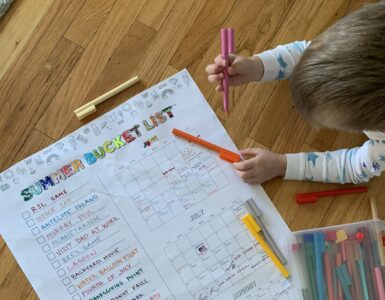Teaching children values and helping them develop positive character traits is one of the most important things parents do. Studio 5 contributor, and co-founder of the Power of Moms website, Saren Eyre Loosli shares 5 simple routines you can incorporate into your child’s schedule to promote you family values.
At our Power of Moms workshops and on our website, whenever we ask parents what sort of people they hope their children will be when they leave home we’ve found that even the most dissimilar parents come up with very similar answers. They want their children to be hard-working and kind. They want their children to be self-starters. They want their children to embrace and value learning. But when it comes to actually teaching these values and engendering these character traits, we can all use some help with concrete, simple, tried-and-true ideas that can be used on a regular basis in our homes.
To make character-building and values-teaching a regular and fun part of our family life, we need to:
1. Begin with the End in Mind: Figure out what values and character traits you want to focus on developing.
2. Create your Game Plan: Come up with daily, weekly, and occasional routines and practices that will teach and reinforce each value.
3. Be Consistent.
4. Regularly Assess and Revise: Look at and revise your list of values and the practices you’re using for each every 6 months or so
Examples of practices to go with the values you want to teach:
Following are some of the practices we use in our family to promote some core values most parents want to teach.
HARD WORK AND ACCOUNTABLITY: Chores and Rewards
· We have assigned daily chores and responsibilities (for keeping the house clean, cleaning up after meals, and taking care of younger kids)
· Our children have charts where they track the things they do each day and get rewarded with money on “pay day” on Saturday based on how many points they got (sample chart attached)
· We teach the concept that doing chores and helping around the house is just part of being in our family so you’ve got to do your “family work” whether you want the points or not. But if you do your work happily, do it quickly and do it well plus you record your points on your chart, you can receive money based on the number of points you track.
· We have our children pay for all the “extras” they want. They pay for any toys or entertainment they’d like plus they pay 1/2 for the extracurricular activities they want to participate in. They’ve really learned to save and budget thanks to this simple “family economy.”
LOVE: “I Love You” Rituals
· Little things mean a lot. And little habits can create warm memories and really strengthen relationships.
· We’ve happened upon a lot of little “rituals” that say “I love you” in our home. For example, three hand-squeezes means “I love you,” we always blow to each other when I drop the kids off at school and we end every day with a big hug and kiss as part of saying goodnight – even for our big kids.
LOVE OF LEARNING: Questions
· In our house, our daily after-school routine includes me always asking the question, “What did you learn today?” The kids know I’m going to ask so they usually watch out for something during the school day that they can use in their answer. This daily question seems to help them see the importance of learning and it offers me a good glimpse into what they are learning and how I can build on and support their interests.
· Wondering list: We keep a list of everything that the kids or I wonder about – everything from “How do lightbulbs work?” to “Why does a glass of ice-cold water get all sweaty?”. Every few days, we take some time to look up some answers to some of the questions on our Wondering List on Wikipedia or YouTube. It’s been so fun to learn new things together and to really encourage and nurture the natural questioning and wondering that our children have.
GENEROSITY, KINDNESS AND EMPATHY: Learning About and Meeting Needs
· Another part of our after-school routine each day includes asking the question, “What did you do for someone else today?” As with the question about what they’ve learned, asking about what they’ve done to help others seems to really help our kids to notice needs and strive to be a good friend.
· Every Christmas, we do a fundraisers to help needy children. We call it a “Children for Children” concert. Our kids and their friends put together a special concert and parents and neighbors come to watch and make a donation in the amount of their choice towards a cause the kids help to select for the year. We research organizations that support needy children around the world and the kids pick a cause, really learn about it, and present information on the children that will benefit to the audience at the concert. One of my favorite moments ever as a mom was when, after our concert one year, my 8-year-old son declared “This was the day EVER! We got so much money for those orphans! Now they’ll get some warm clothes for Christmas!”
AWARDS: Reinforce the Positive
In addition to these specific ideas for teaching each value, something our family loves doing is weekly family “awards.” At Sunday dinner, we have the kids nominate themselves or someone else for awards like the “Super Friend” award (for being a really good friend to someone) or the “Self-Starter” award (for noticing something that needs to be done and doing it without asking) or the “Neat as a Pin” award (for keeping their room nice and neat all week). It’s wonderful to hear the kids share times they’ve exhibited positive character traits during the week as they put themselves “in the running” for the award. The awards are just decorated pieces of paper but the kids are so proud to display the award they won on their bedroom door for the week until it’s time to bring the awards back to the Sunday dinner table and pass them out again.
There are so many simple little things we can do each day and each week in our homes to help our children embrace the values that are important to us and develop the positive character traits that will serve them well in life. But we need to begin with the end in mind.
First, we need to figure out what you really want to teach our children. Then we need to come up with ideas to go with each one. I hope some of these ideas will work for you and that they’ll spur you to think of your own ideas that will likely be even better!
For more of Saren’s ideas on deliberate, pro-active mothering, visit powerofmoms.com. Also, check out the exciting Couples Retreat that The Power of Moms and valuesparenting.com is co-sponsoring in Park City on September 10th.















Add comment